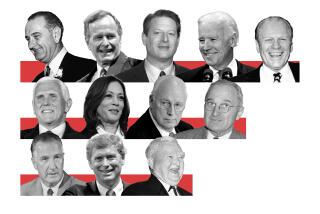Bush, Dukakis: Handicapping the Handicaps
- Share via
Despite very real differences on issues, presidential candidates George Bush and Michael S. Dukakis have a lot in common.
The presumptive nominees were born within 5 five miles of one another in Massachusetts. Both are dull campaigners who try to compensate by projecting an image of competence and relevant experience. The latest polls show them in a virtual dead heat.
And, in a country where presidential elections are normally won in the middle of the road, both are under pressure to make potentially disastrous concessions to party elements that are outside the American mainstream.
Dukakis has some things going for him. The experience of the last 30 years suggests, however, that his problems are less manageable than Bush’s.
On the plus side for Dukakis, a recent poll showed that one-fifth of voters who went for Ronald Reagan in 1984 expect to vote Democratic this time.
There is, however, another set of political arithmetic.
Assuming Dukakis gets the nomination, the Democrats will have chosen a Northern liberal for the fourth time in the last six elections. The previous three--Walter Mondale, George McGovern and Hubert Humphrey--all lost. To win, Dukakis must do very well in the South, where Bush is strong, and among white blue-collar workers who so far have not been especially turned on by his message.
This means that Dukakis, the liberal activist, must move toward the center. But to do that will risk serious erosion of support among blacks, the Democrats’ most faithful constituency.
Jesse Jackson has no chance of winning the Democratic nomination. But he has won too many votes in the primaries to be ignored. Jackson probably can be counted upon to work for a Dukakis victory in November--for a price.
Signals from the Jackson camp indicate that he will try to use his leverage to nudge Dukakis into campaigning on the Jackson agenda, which includes items of broad appeal but on balance is well left of center.
In short, Jackson will try to move Dukakis even further to the left--the opposite of where he, as a liberal, needs to go.
If Dukakis accommodates Jackson, he will lose votes among Southerners and other conservative Democrats. If he doesn’t, a lot of black voters may stay home on election day.
Bush has his own problems with the Republican right wing, which fumes that he is taking them for granted. He would not like to see them sit out the campaign. But his strong following among rank-and-file Reagan loyalists puts him in a good position to resist their extremist demands.
Bush also has the edge in the battle of the resumes. If you can believe some polls, the voters want the next President to be a competent leader who knows his way around Washington. Bush has served in Congress and as ambassador to the United Nations, GOP national chairman, envoy to China, director of the Central Intelligence Agency and vice president.
Dukakis is a governor and former state legislator. Period. He has never worked in Washington and has exhibited a dubious grasp of foreign affairs.
The governor has scored some success in claiming competence on the basis of his state’s economic gains. Bush strategists are confident, however, that they can deflate the “Massachusetts miracle”--the state has actually lost factory jobs during Dukakis’ tenure--and exploit his weakness on defense issues. Bush’s most intractable problem springs from the nature of the vice presidency--a notoriously dubious launching pad for a presidential bid. (No sitting vice president has been elected to the top job since 1836.)
A vice president finds it difficult to establish his identity as a strong leader with ideas of his own. He cannot appropriately disavow unpopular policies of the President he hopes to succeed, and he is inhibited from making positive proposals in conflict with the policies of the outgoing Administration.
Bush, for example, could be mightily damaged by the “sleaze factor” if Atty. Gen. Edwin Meese remains in office much longer. But he cannot publicly demand Meese’s removal.
Even if Bush advised against the attempt to trade arms for hostages in Iran--and there is no evidence that he did--he cannot say so without violating the confidentiality of his relationship with Reagan.
It is hard to believe that Bush really thinks the anti-plant closing provisions of the trade bill would destroy U.S. competitiveness. But he has supported that Reagan absurdity, leaving Dukakis free to pose as the champion of workers and communities threatened by corporate callousness.
For Bush, there is no easy way out of the dilemma. It’s a safe bet, though, that he wouldn’t trade his problems for those faced by Dukakis.
More to Read
Get the L.A. Times Politics newsletter
Deeply reported insights into legislation, politics and policy from Sacramento, Washington and beyond. In your inbox twice per week.
You may occasionally receive promotional content from the Los Angeles Times.










